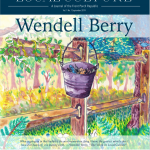Literary anti-heroes can seem romantic: Holden Caulfield, Hamlet, Meursault, and, chief amongst these brooding men, Wuthering Heights’s Heathcliff. Heathcliff emerges from the pages like a dark elemental force—a creature as wild and ungovernable as the Yorkshire moors that shape and shelter him. Found as a nameless orphan and absorbed reluctantly into a fragile household, he grows into a figure of feral passion and relentless vengeance, unmoored from any communal obligation or moral restraint.
Neither fully villain nor tragic hero, Heathcliff embodies a radical individualism so absolute that it corrodes every relationship and every patch of land he touches. His love, fierce and possessive, curdles into hatred; his longing for belonging twists into a campaign of generational revenge. In Heathcliff, we confront the terrifying specter of a soul severed from the common good—a man who forsakes reconciliation and stewardship for the consuming fire of his own wounded will. Through Heathcliff’s alienation, Wuthering Heights serves as a dark meditation on what happens when personal grievance overtakes the common good, echoing contemporary concerns about atomization and social fragmentation.
In an Anglo-Saxon world, Heathcliff is an outsider. Alluded to be of Romani or otherwise “foreign” descent, he is originless—as Mr. Earnshaw exclaims upon introducing him: “See here, wife! I was never so beaten with anything in my life: but you must e’en take it as a gift of God; though it’s as dark almost as if it came from the devil.” This dark complexion and diabolical framing underscore his otherness, further reinforced by the boy’s linguistic “gibberish,” sullen demeanor, and lack of recognizable lineage.
Through Heathcliff’s lack of belonging, Brontë underscores the importance of rootedness and communal acceptance. As Nelly recounts: “Mrs. Earnshaw was ready to fling it out of doors… asking how he could fashion to bring that gipsy brat into the house when they had their own bairns to feed and rear,” and he “seemed a sullen, patient child; hardened, perhaps, to ill-treatment: he would stand Hindley’s blows without winking or shedding a tear.” Thrust into a home that never truly receives him, Heathcliff internalizes cruelty until it calcifies into lifelong resentment.
This resentment festers in adulthood. In Chapter 17, he tells Catherine: “I seek no revenge on you… That’s not the plan. The tyrant grinds down his slaves and they don’t turn against him; they crush those beneath them. You are welcome to torture me to death for your amusement, only allow me to amuse myself a little in the same style.” Here, Heathcliff reveals how private humiliation, stewed in isolation, transforms into a corrosive desire to wound and dominate others in turn. Yet this desire is ultimately ruinous, even to Heathcliff himself by the end of the novel, “I have lost the faculty of enjoying their destruction, and I am too idle to destroy for nothing.”
From this portrait of Heathcliff as the perpetual outsider, two haunting questions emerge: How does Brontë weigh the Christian call to forgiveness against a darker, Nietzschean ethos of revenge? And what does his fate reveal about a community’s duty to welcome and heal its outsiders?
The Christian call to forgiveness is a radical light missing in the midst of the moor’s darkness. Forgiveness insists that the wounds of the world can only be healed through mercy, not through returning harm for harm. In Wuthering Heights, this ethic is faint but present—mostly in negative relief. The text suggests its necessity by illustrating the devastation wrought in its absence. Nelly Dean often represents a more Christian, moral voice, encouraging Catherine and others toward moderation and reconciliation, and similarly young Cathy, in the final chapters, shows glimmers of forgiveness as she offers to teach Hareton to read. These moments offer a movement away from the cycle of inherited vengeance embodied by Heathcliff. The ending’s relative peace hints at redemption made possible through acts of mercy and new bonds, a blooming relationship and dark past put to rest, contrasting sharply with Heathcliff’s path.
By contrast, Heathcliff embodies something like a pagan or proto-Nietzschean ethos of revenge and will to power. He lives by a code of retributive justice, closer to an ever more destructive “eye for an eye” as he does not seek justice so much as domination. He insists on imposing his private pain onto the entire social and familial structure. Nietzsche, in On the Genealogy of Morality, famously praises the “noble” ethos that refuses to forgive and instead asserts its own values and vengeance. Heathcliff’s life embodies this dark assertion of power against all perceived wrongs, untethered from any communal or transcendent good.
The novel does not explicitly advocate the Christian path, nor does it glorify revenge. Instead, it sets these two visions in stark contrast, letting the consequences speak. Heathcliff’s revenge corrodes everything, leaving him hollow, alienated, and ultimately unfulfilled. His death is not triumphant but restless, haunted. Brontë thus critiques the Nietzschean “will to power” as self-consuming. Meanwhile, Cathy and Hareton’s tentative union and reclaiming of the Heights—suggests the possibility of forgiveness and renewal, however small. It does not present Christian mercy as fully victorious but as a faint hope, a necessary condition for real rootedness and healing. In this way, Wuthering Heights acts less as a theological treatise and more as a moral landscape: it shows the tragic cost of vengeance and the slow, difficult possibility of forgiveness. It dramatizes the Christian ethic not by direct preaching but by exposing the spiritual ruin of its opposite.
Once more through the negative, Wuthering Heights offers a critique of how the “other” is treated in communities of multiple scales. At the most intimate level, community fails to form within the family as the Earnshaw house immediately positions young Heathcliff as an outsider, treated coldly at best and violently at worst. Instead of integrating Heathcliff into the family through love, discipline, and shared life, he is both spoiled and brutalized in turn, creating a household marked by rivalry and resentment rather than hospitality and moral formation. The family fails as a community of first belonging—it neither offers true welcome nor clear moral boundaries. This points to a fundamental truth: how a home treats the “other” (the newcomer, the orphan, the difficult member) reveals and shapes its deepest character.
A healthy localism should be open enough to transform and receive the stranger without losing its core.
Moving beyond the household, the novel suggests that insular local communities can become morally stagnant when they rigidly define belonging by blood, appearance, or inheritance. A healthy localism should be open enough to transform and receive the stranger without losing its core. The novel implies that true community requires a shared moral vision—a “common good” to which all members, even former outsiders, can be called. Without this, estrangement festers into vengeance and spiritual ruin. This is where Heathcliff fails, as he rejects Christian forgiveness and refuses any transcendent good that might bind him to others. His radical individualism severs him from the moral community in the deepest sense.
Wuthering Heights offers a sobering portrait of how communities at every scale—family, village, and spiritual—can fail the “other” when they prize closed inheritance over generous hospitality. Heathcliff’s tragic arc becomes a dark parable of what happens when a community cannot integrate the outsider into its moral and social life: resentment festers, bonds dissolve, and place itself becomes a stage for vengeance rather than a home for renewal.
Wuthering Heights thus offers more than a stormy tale of doomed romance and haunted moors; it presents a sobering warning against the corrosive power of unmoored individual grievance. In Heathcliff, we see what happens when private wounds harden into lifelong vendettas—how a soul, cut off from forgiveness and community, can poison not only relationships but entire generations and landscapes. His relentless pursuit of revenge reduces homes to battlegrounds and love to a weapon, unraveling the moral bonds that sustain any true community.
If Brontë’s novel stands as a cautionary tale, it also quietly gestures toward a remedy. Genuine rootedness—the kind that nurtures rather than destroys—demands more than mere attachment to place; it requires forgiveness, mutual responsibility, and a shared vision of the good. Only when we refuse to let grievance define us, and instead embrace stewardship and reconciliation, can our love for place and neighbor bear life-giving fruit rather than wither into isolation. In a fragmented age increasingly seduced by the cult of the self, Wuthering Heights challenges us to reclaim the difficult virtues that make real community possible.
Image Credit: Fritz Eichenberg, “Heathcliff Under the Tree” (1943) via Wikimedia.







1 comment
Barbara Castle
Raleigh,
I appreciate your insightful look into this matter at Wuthering Heights. I have re-introduced it into my World Lit II course and encourage students to think deeply on what is underneath the iceberg of the love affair between Heathcliff and Catherine. It is a timely issue to explore the toxic relationship, as opposed to the one glamorized by film in the last 100 years – especially in light of the upcoming Hollywood remake. This is not to say that the love affair and the psychological infatuation that many women (myself included) feel for Heathcliff is not real…but to explore “why” it is real. What is it in our human DNA that makes the story so enticing and the character so much the ultimate “bad boy” fantasy for the best of women? Perhaps it has to do with all the points you are making. The discerning reader will see the match for a drive within many of us to form community, to bring in the orphan, – to be about the business of “family-making.” I too teach the tale as “spiritual ruin” for all the reasons you delineate. Yet, I think it is worth continuing to plumb the layers for why this “ruin” captivates the heart and mind the way it does. I don’t have answers, but I like finding another soul who is searching for it. As mentioned, it is a good time to explore and talk with students in light of the new film coming out. Regardless of how it is spun – conversations can abound on the themes it forces before us.
Comments are closed.